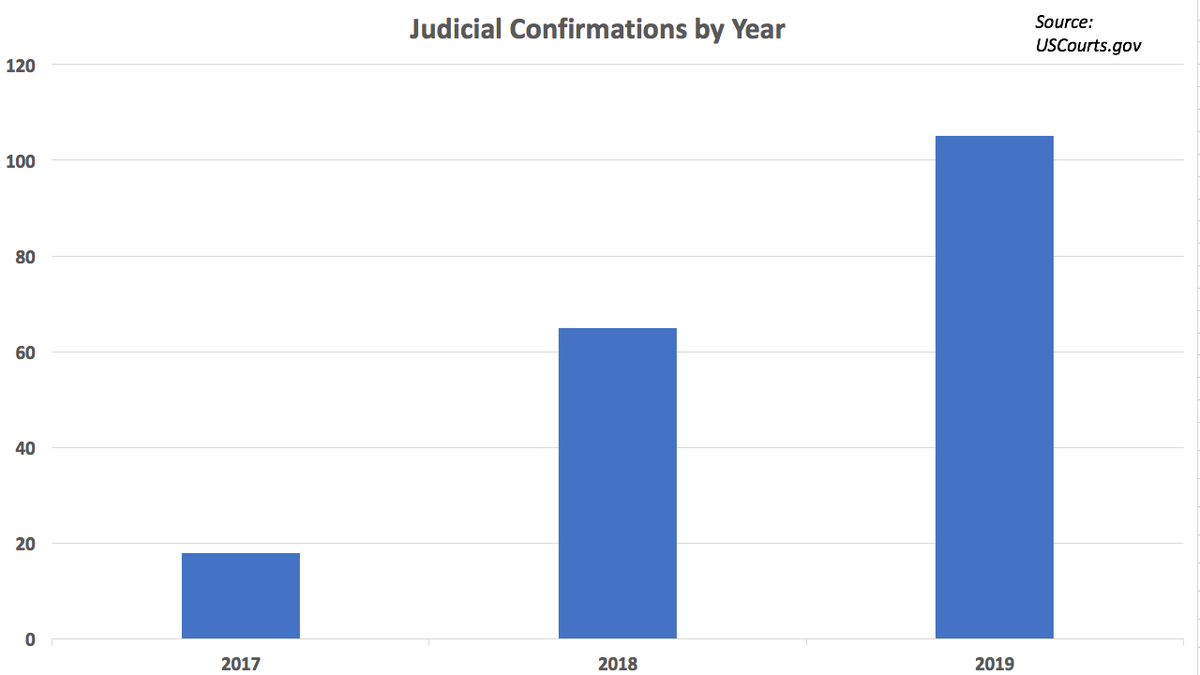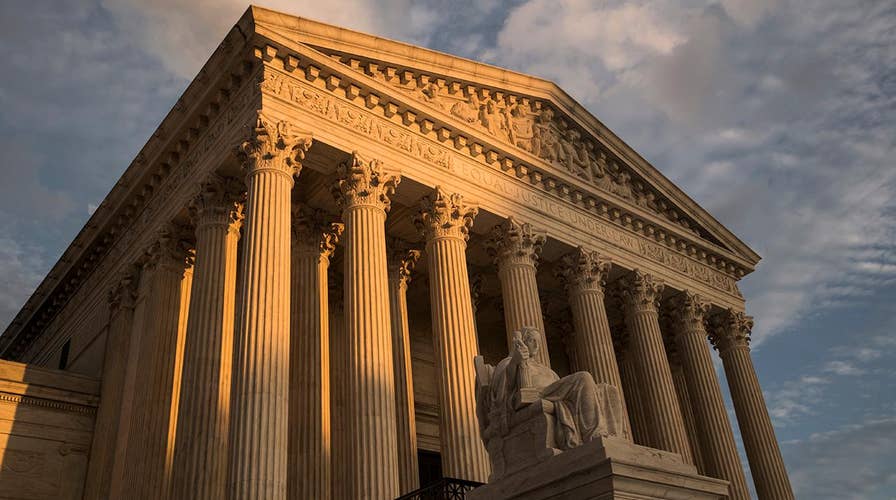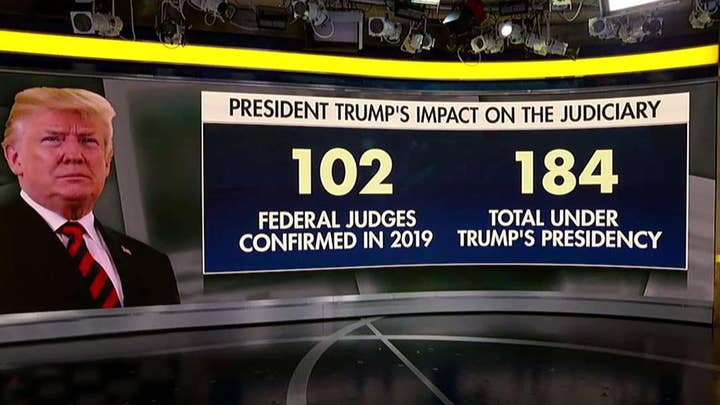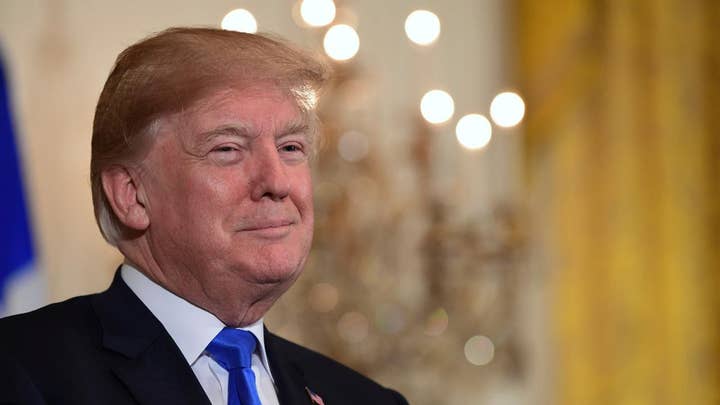Supreme Court considers key religious schools case
Espinoza v. Montana Department of Revenue could make it easier for Americans to use public money to pay for religious education in states across the nation; Gillian Turner reports from the Supreme Court.
Three years into President Trump’s term, the Senate has confirmed 192 Trump-appointed federal judges.
But what does that mean for the country's judicial system?
Here's a look at how the president has reshaped the federal judiciary.
Rulings have changed as some circuit courts have “flipped," and others are close to flipping
The Supreme Court gets the most attention, but it only rules on about one-tenth of one percent of all appeals court cases, so the final appeals courts (called circuit courts) almost always get the last word.
During the Trump administration, three federal appellate courts have “flipped” from being majority Democratic-appointed to being majority Republican-appointed. The flipped courts (the 2nd, 3rd, and 11th circuits) have jurisdiction over many populous eastern states: Florida, Georgia, Alabama, New York, Pennsylvania, New Jersey, Connecticut, Vermont, and Delaware.
More than a quarter of all federal appeals court judges have now been appointed by Trump.
The 9th Circuit, which has jurisdiction over California and many other western states, has long been known for left-wing legal decisions. When Trump became president, the balance on the court was 18 Democratic-appointed judges to just 7 Republican-appointed ones.
But after Trump’s appointees filled the court, the balance is now a much more even 16 to 13, still with a majority of Democrats.
As the court has become more balanced, its rulings have changed as well.
In July 2018, the court issued a surprise ruling striking down a California ban on firearm magazines capable of holding 10 bullets or more.
In June 2019, it allowed the Trump administration to withdraw federal funding from any medical facility that provides abortions or offers abortion referrals.
In July 2019, it allowed the administration to direct community policing grants to cities that are not “sanctuary cities.”
Legal experts say more is down the road.
“What’s happened so far is a very small part of what’s to come,” John O. McGinnis, professor of constitutional law at Northwestern University, told Fox News. “The biggest thing is that these judges will create a cultural change in the legal profession... lawyers, law schools... will study their decisions and that will shift their thinking... toward interpreting the original meaning of the constitution.”
Trump’s judicial picks are better qualified than usual
“They are better-credentialled than usual,” McGinnis said. “This is acknowledged even by people who don’t like the Trump judges.”
An analysis by the left-wing news site Vox found that: “Based solely on objective legal credentials, the average Trump appointee has a far more impressive résumé than any past president’s nominees.”
It based that on the fact that, as it found: “Approximately 40 percent of Trump’s appellate nominees clerked for a Supreme Court justice, and about 80 percent clerked on a federal court of appeals. That compares to less than a quarter of Obama’s nominees who clerked on the Supreme Court, and less than half with a federal appellate clerkship.”
McGinnis said that having smart appointees also matters because they are more influential than their colleagues.
“In these appointees, we see some very strong judges who are likely to be more influential than average,” he said.
Other legal scholars also say Trump’s appointments are uniquely intellectual.
“As someone who is not a Trump fan, I think the appointments have been excellent, overall a brilliant, interesting group of judges... [with] a lot more professor/former professor types than Bush appointed,” David Bernstein, a law professor who teaches constitutional law at George Mason University, told Fox News.
Trump’s judicial picks are younger than usual
Bernstein added that Trump has been appointing very young judges.
“They are young... I think age 55 has been the [informal] cutoff, and many are substantially younger, so they will be on the courts for a long time,” Bernstein said.
The numbers back that up, and the Trump administration touts it. The White House reported in a November fact sheet: “The average age of circuit judges appointed by President Trump is less than 50 years old – a full 10 years younger than the average age of President Obama’s circuit nominees.”
The young and credentialed appointees appear to be part of a conscious effort by the administration to remake the courts.
"We have to pick a great one, we have to pick one that's going to be there for 40 years, 45 years," Trump said during a 2018 rally. "We need intellect, we need -- so many things."
Bernstein noted that the judges fit the mold of conservative legal philosophy broadly.
CLICK HERE TO GET THE FOX NEWS APP
“I think there was a fear in some circles that Trump would appoint cronies and hacks. Hasn't happened,” he said.
“They’re very distinctly originalist judges,” McGinnis said. “They’ll follow precedent -- but when there isn’t clear precedent, they will look at the original meaning of the Constitution.”
Senate Republicans are on track to fill all current judicial vacancies
When Trump took office, there were 114 unfilled court seats. In addition to those, 157 new seats opened in the last three years.
Trump’s judicial confirmations got off to a slow start, with only 18 confirmed in 2017. In 2018, 65 were confirmed – still far too slow a pace to clear the backlog.
But in April 2019, Senate Majority Leader Mitch Connell passed a Senate rules change that allowed much faster approval of judges. As a result, 105 judges were cleared in 2019.

If the Senate is able to continue its rate of approval (10 judges a month) since the rules change, all current vacancies (79) will be filled by the end of Trump’s term. If the current speed is maintained, there is also room to fill most new vacancies that will arise in 2020.
But Bernstein said that, even with all the new judges, Trump’s many appointees have merely brought the legal system back towards balance ideologically.
“The judiciary still leans left because of holdover Obama and Clinton appointees. You would need a second Trump term to change that,” Bernstein said.
“The Ninth Circuit has definitely changed dramatically thanks to Trump appointees, but would flip right back if a Democrat is elected in 2020,” he added.
Maxim Lott is Executive Producer of Stossel TV and creator of ElectionBettingOdds.com. He can be reached on Twitter at @MaximLott
















































